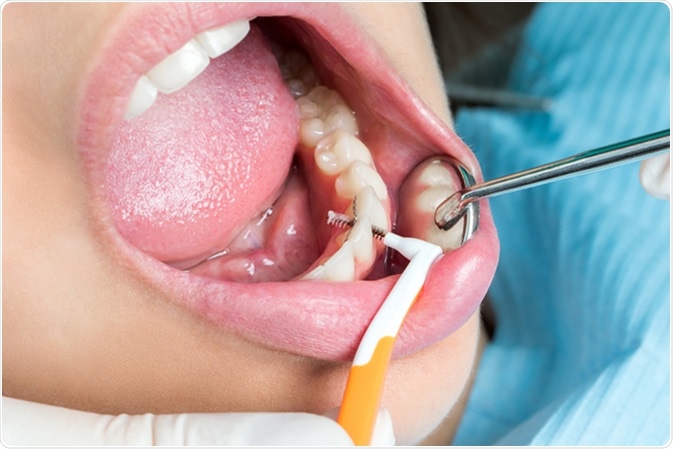It is important for pregnant women to take good care of their teeth throughout their pregnancy. This is because they are more likely to be affected by some dental conditions due to the hormonal changes in pregnancy. Additionally, some dental procedures are not recommended while women are pregnant due to the potential risk of harm to the fetus.
Hormonal changes that occur during pregnancy, particularly the rise in progesterone, are thought to be responsible for increased susceptibility to dental conditions such as gingivitis and periodontitis. This involves inflammation and bleeding of the gums and, in severe cases, infection of the connective tissues surrounding the teeth. It is also linked to an increased risk of having a baby born preterm or with low birth weight.

Image Credit: karelnoppe / Shutterstock
Preventative Dental Procedures
Preventative dental cleanings are safe and recommended during pregnancy because they can help to prevent gingivitis and its complications. Additionally, cavity fillings and crowns can be put in to help reduce the risk of infection.
When possible, it is considered safest to postpone any non-urgent dental work until after the birth of the child to prevent the possibility of complications. This includes elective treatments such as teeth whitening and cosmetic procedures. However, significant dental procedures such as root canal or tooth extraction may sometimes be required for pregnant women.
If dental work is necessary during pregnancy, the second trimester is usually the best time to schedule it. Once the pregnant uterus enlarges to a much more significant extent in the third trimester, it can be more difficult for the woman to lie on her back for the long periods of time required for many dental procedures.
Medications for Dental Procedures
There is some evidence to suggest that some medications used during dental work for pregnancy could have adverse effects on fetal development.
For example, lignocaine is a medication commonly used as an anesthetic during dental work, and is known to cross the placenta. Therefore, it could have the potential to affect the fetus. For this reason, it is recommended to use as little anesthesia as possible for pregnant women, just enough to keep the woman comfortable during the procedure. The dose can then be increased as needed if the woman reports feeling pain.
Additionally, antibiotics such as penicillin, amoxicillin and clindamycin are commonly prescribed after dental procedures to prevent or treat infections in the area. These antibiotics are considered to belong to safety category B in pregnancy and may be prescribed in appropriate cases.
Dental X-Rays
When possible, it is best to avoid routine x-rays during pregnancy to minimize the fetal exposure to the radiation. For this reason, routine x-rays are recommended before trying to conceive and after the birth of the baby.
However, diagnostic dental x-rays may very occasionally be required for pregnant women, especially for emergency dental procedures. The American College of Radiology claims that the radiation dose used in diagnostic x-rays, with the use of appropriate shielding, is not high enough to cause adverse effects to the fetus. Nonetheless, it is usually preferred to avoid unnecessary x-rays to minimize any potential risks.
Dental Care Recommendations for Pregnant Women
Women who are pregnant should be advised to take good care of their teeth to help prevent common dental conditions in pregnancy, such as gingivitis and periodontitis. They should be encouraged to:
- Brush their teeth at least twice a day
- Floss daily
- Use an antibacterial mouthwash
These activities help to remove plaque from around the teeth and gums on a regular basis so that it is difficult for a bacterial infection to take hold. Additionally, regular check-ups throughout pregnancy are important to monitor the health of the teeth and gums. If the woman notices any bleeding from the gums, she should be advised to see a dental or medical professional and decide with their help on an appropriate course of action.
References
Further Reading
Last Updated: Dec 29, 2022